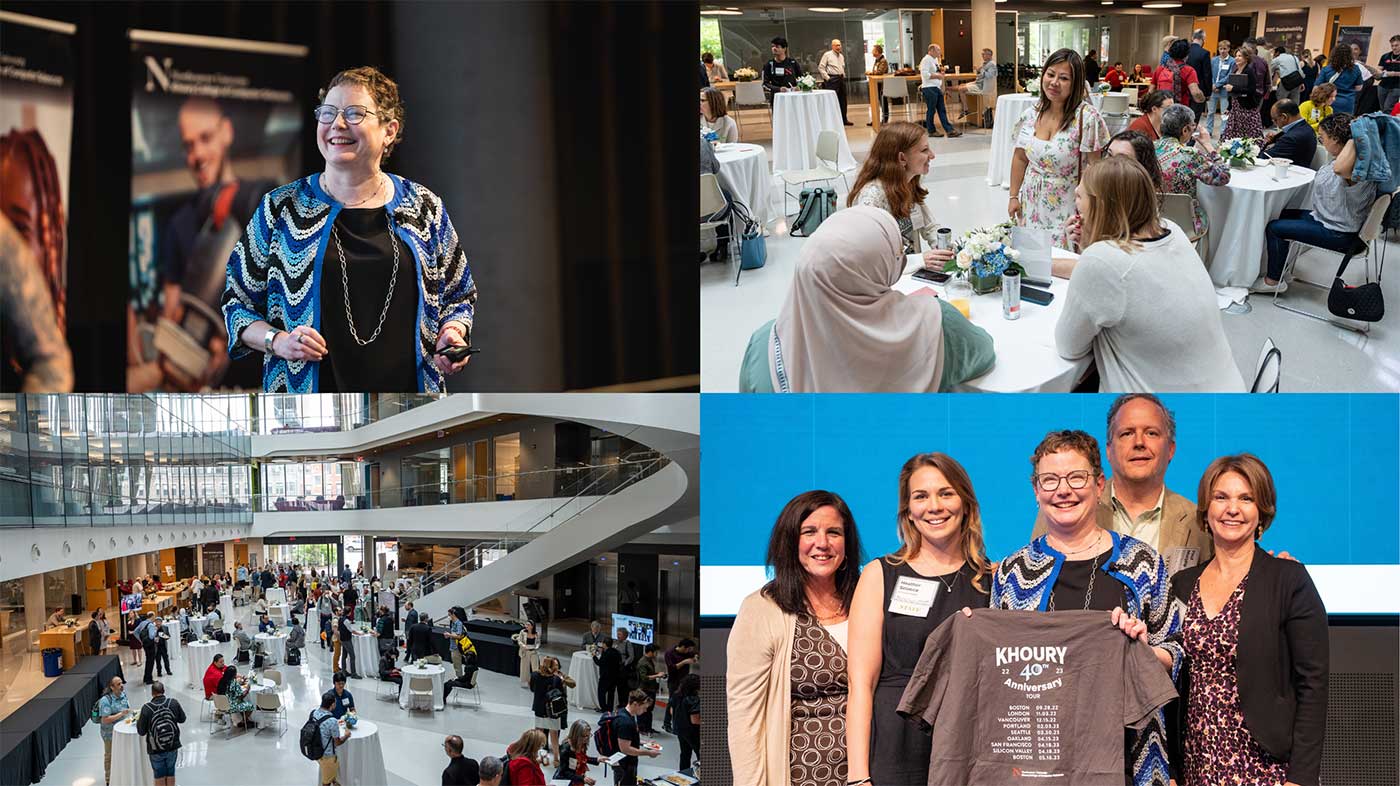Past, present, future: Khoury College comes together to conclude 40th anniversary celebration
Author: Milton Posner
Date: 05.19.23
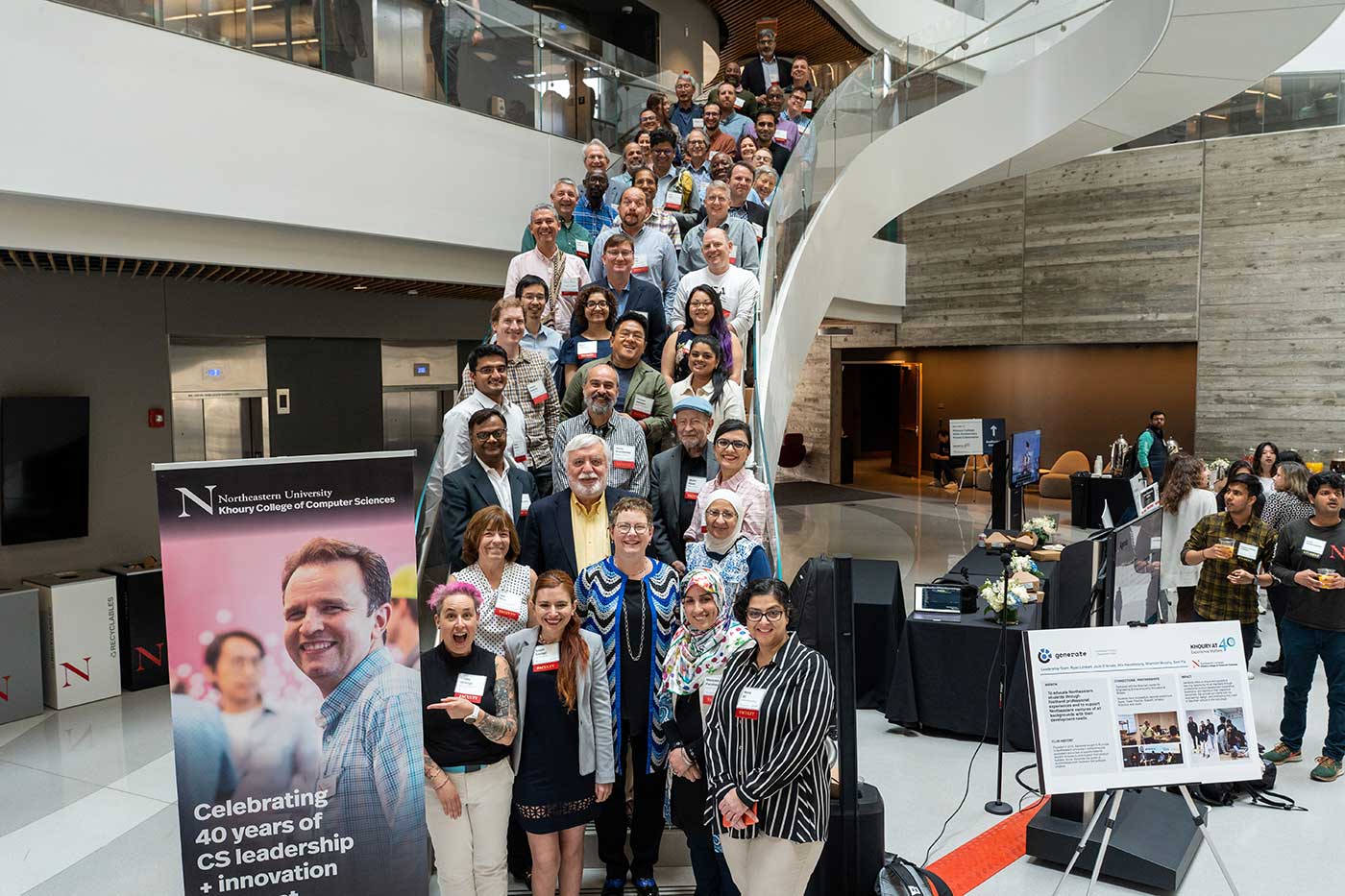 Photos by Ian MacLellan
Photos by Ian MacLellanThis piece is the last in a series on Khoury College’s 40th anniversary celebrations, a series that also covers events in Boston, London, Vancouver, Portland, Seattle, and California.
Tally up the travel involved for the Boston-based coordinators of Khoury College’s 40th anniversary celebration, and you’ll get 22,000 miles — nearly enough to circle the globe.
Then again, that’s appropriate.
“It was an amazing opportunity for us to connect across our global network and rediscover post-pandemic the values that bring us together,” Dean Elizabeth Mynatt said at the anniversary’s culminating celebration, held on Tuesday at Northeastern’s Interdisciplinary Science and Engineering Complex in Boston. “This 40th journey recognized the individual spark and focus of our campuses. They’re not Boston copies.”
So on Tuesday, with members of those campuses among the 200 students, faculty, staff, and industry partners attending in person, as well as an additional 200 via live stream, the event marked a pivot from a storied past to an exciting future. And as the attendees moved through panels, presentations and breakout sessions, through speeches and honors and munching and networking, it all pointed to the key idea that underpinned the yearlong celebration.
“All of our stops have reinforced our mission of computer science for everyone,” Mynatt noted. “Impact, innovation, partnership — it all comes back to this mission and what our next 40 years will look like.”
In the morning
“This is a golden age — and a very interesting moment — for computer science, and Khoury College stands at the forefront of the discipline,” said David Madigan, a Khoury College professor best known for his role as Northeastern’s provost and senior vice president for academic affairs. “For decades, the college has exemplified commitment to research and the dissemination of knowledge to learners all over the globe.
“Computer science has never been more important,” Madigan continued. “It can elevate mankind to great new heights, or it can destroy us all.”
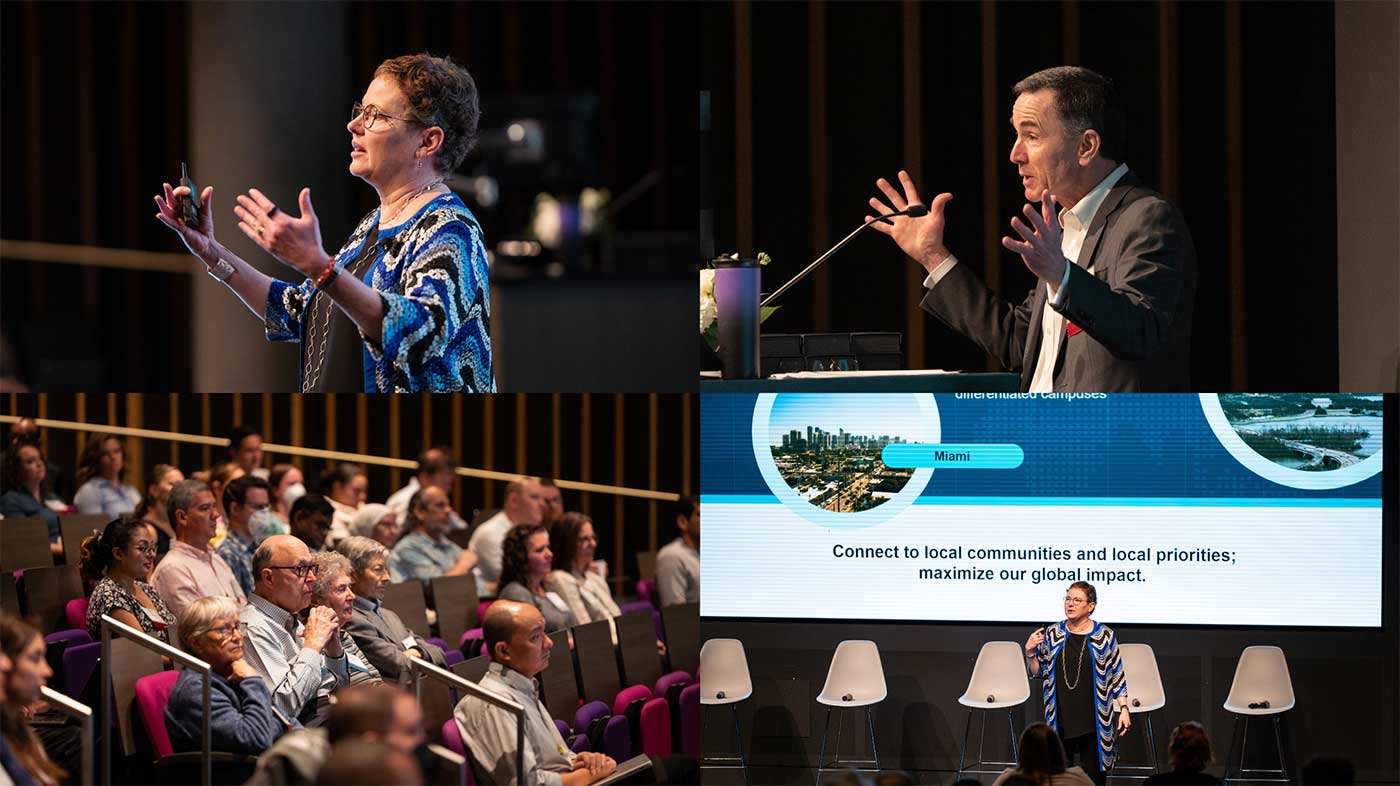
Those stakes underlined the day’s first panel, in which David Choffnes, Khoury professor and executive director of Northeastern’s Cybersecurity and Privacy Institute, queried fellow Khoury professor Abhi Shelat, Khoury research scientist Daniel Dubois, investigative tech journalist Julia Angwin, and Stephanie Nguyen, chief technology officer for the Federal Trade Commission (FTC). The central question: how can research and information produce positive change in the cybersecurity and privacy realm?
“Most of the journalists I talk to will say how depressing it is to write something and have no impact, especially when you clearly show that something is wrong,” Angwin said. “I always counsel them that it’s a long game. You don’t always get impact right away, but putting information out to the public is a service. It does change the discourse and lead to change.”
Angwin cited her investigation into risk assessment algorithms, which are often used to gauge the likelihood of criminal activity from people eligible for parole and pretrial release. Demonstrating the racial biases in many of these algorithms, Angwin said, “led to replication and validation,” making conversations on the topic more widespread, concrete, and informed.
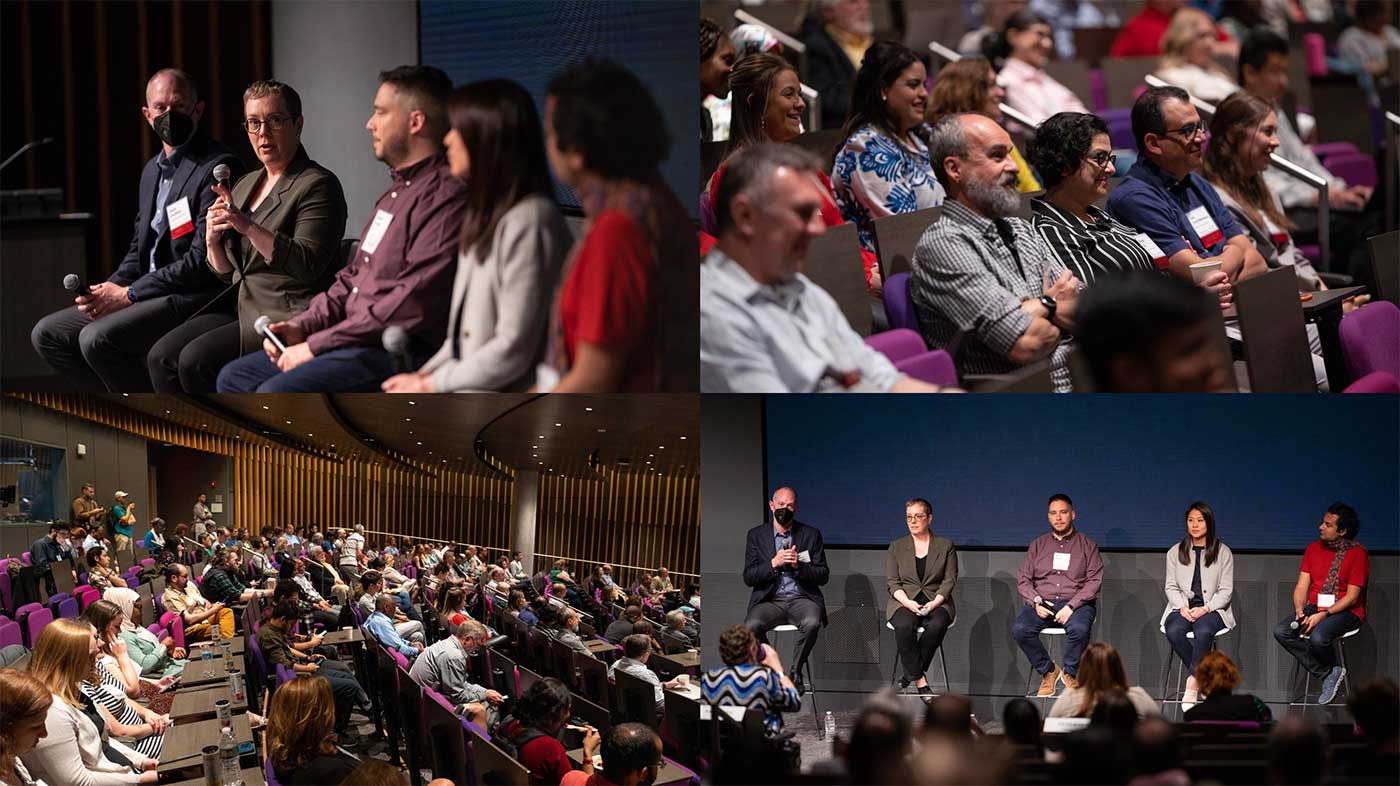 The panel, from left to right: moderator David Choffnes, Julia Angwin, Daniel Dubois, Stephanie Nguyen, Abhi Shelat.
The panel, from left to right: moderator David Choffnes, Julia Angwin, Daniel Dubois, Stephanie Nguyen, Abhi Shelat.
For her part, Nguyen advised researchers on how they could help the FTC protect consumers: explain who is being harmed, by whom, and at what scale.
“We want to have conversations with you and know what you’re doing before everything is fully baked,” she explained. “If you get your information out in ways that ask questions and get at the themes you’re seeing, it helps us to understand what to look at.”
On the heels of that panel came a second group helmed by Benjamin Hescott, senior associate dean of academic programs and student experience. Joining him were Khoury professor Christo Wilson, Khoury student James Chang-Davidson, May Olatoye of Amazon Web Services, UKG diversity professional Angela Harper, and Vance Ricks, a professor jointly appointed between Khoury College and the College of Social Sciences and Humanities. Their topic: how education can cultivate computing leadership.
“Khoury College is making students philosophically literate in computing and social issues … It helps you understand the challenges that exist and apply computing to social issues,” Chang-Davidson said, adding that the college had room to extend and expand that work through its curriculum, hands-on projects, and student organizations. “The places where I learned the most were the ones where I was most uncomfortable and most challenged … Challenges are inevitable in human interactions, so we need to prepare our students with the right resources to handle those situations.”
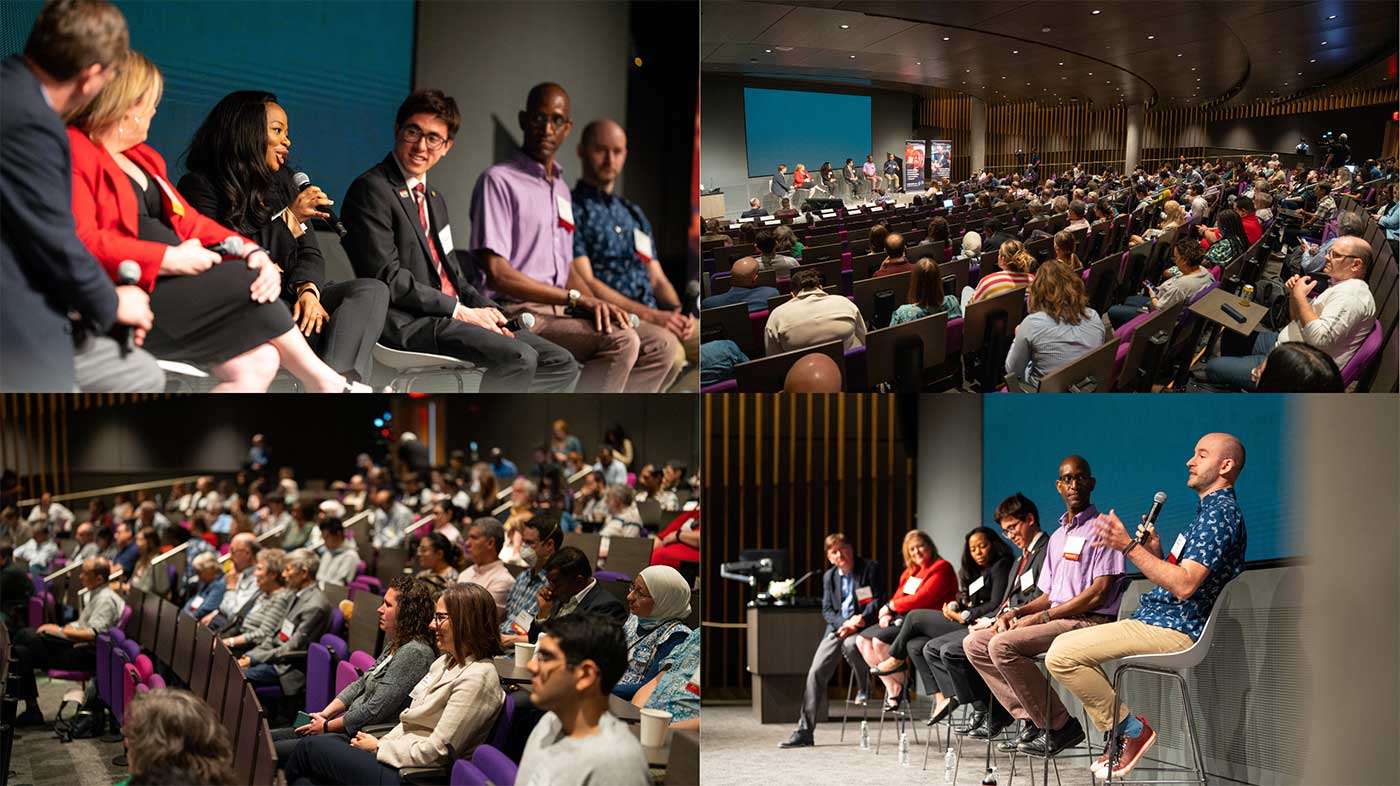 The panel, from left to right: moderator Benjamin Hescott, Angela Harper, May Olatoye, James Chang-Davidson, Vance Ricks, and Christo Wilson.
The panel, from left to right: moderator Benjamin Hescott, Angela Harper, May Olatoye, James Chang-Davidson, Vance Ricks, and Christo Wilson.Wilson and Ricks, the two Khoury professors on the panel, also emphasized the role of education in strengthening students’ soft skills for countless technology-related careers — including ones that are brand new or don’t yet exist.
“One thing we have to do better on is not necessarily steering everyone to industry,” Wilson said. “There are whole ranges in the economy that we didn’t think of as ‘tech’ ten years ago, but they’re tech now. Those opportunities are there to cause change in the world.”
In the afternoon
For previous 40th anniversary events, Dean Mynatt and a core Boston team flew to each spoke in the network. This time, with the college funding travel, the network came to them.
And as the afternoon began with a showcase of student organizations and master’s projects, that network was well represented. LeAnn Mendoza, an Align student in Silicon Valley, represented the campus’s new ACM-W chapter, which aims to engage and advance women in computing. Joining her and a handful of other non-Boston students in the ISEC lobby were a variety of groups, from software-driven engineering outfits like Northeastern Electric Racing and the Northeastern University Mars Rover Team, to community-forward coding groups like Sandbox and, well, Code4Community.
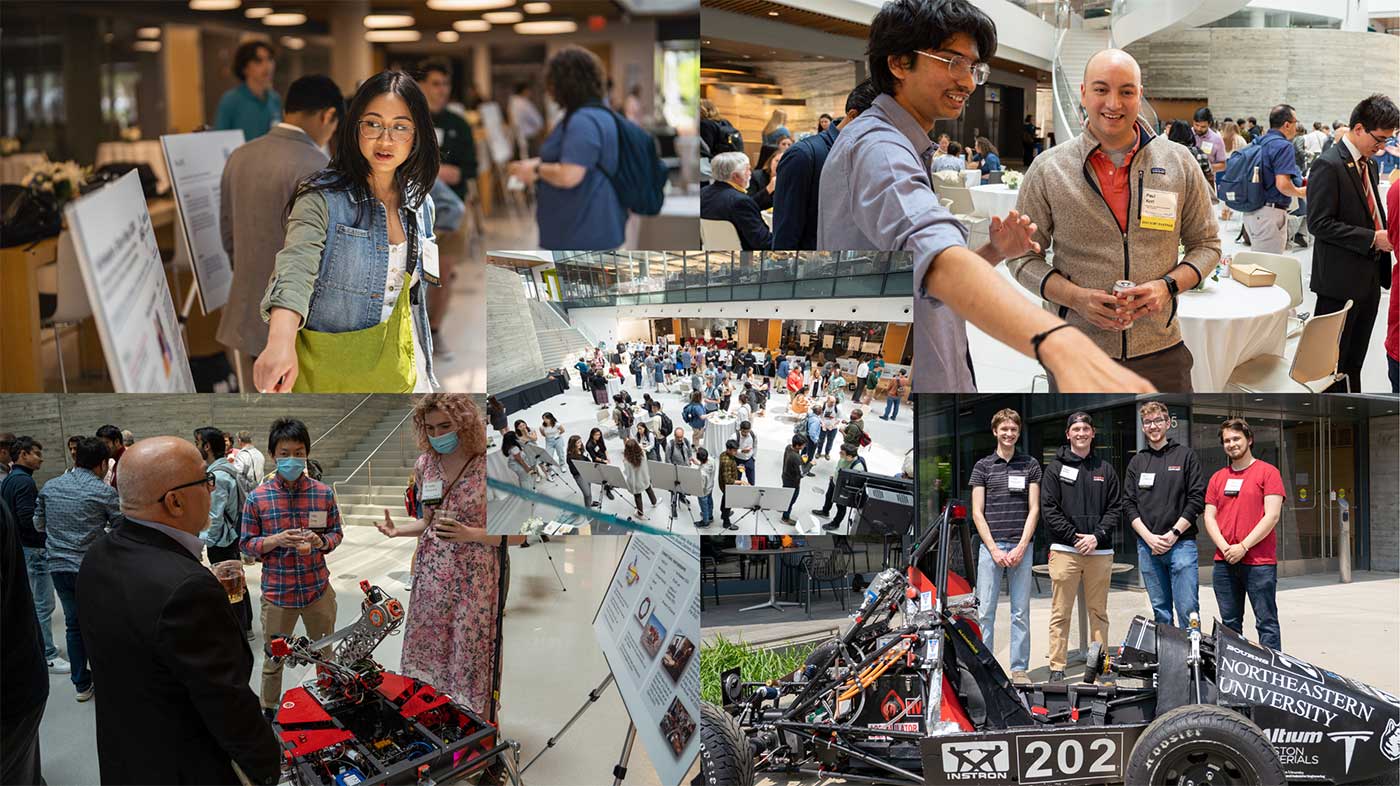
Immediately afterward, the event split into five breakout sessions for attendees to deliberate on the college’s future and the computing issues of the day, then present their findings to everyone.
“The group that comes closest to their allotted time gets to be first in line at the bar,” Mynatt joked.
From the first session on new experiential learning journeys came a quartet of ideas: an intro course that would act as a menu for new students to pinpoint their learning goals and opportunities; a service learning option where students could gain teaching and internship experience, mentor and be mentored, and reflect on their learning; students teaching students to facilitate solo and group projects; and a collaborative effort to solve key global problems.
The second session, on creating community-centric human-in-the-loop AI systems, offered a range of approaches to combat a key societal ill — loneliness — including a workplace task streamliner that aims to free up time and combat workplace isolation. The third session, on AI-assisted programming, was of particular relevance given the topical and transformative nature of generative AI in the computing community.
“We want to break this trend of universities just reacting to generative AI,” Professor Arjun Guha remarked. “In the last year or so, it’s beginning to change. The industry has started to become more democratized, there are more open and academic models, and I would like our university to get more involved in this democratization.”

The fourth group delved into the role of computing research in boosting underserved populations.
“A great portion of the technologies that have been designed have focused on populations that come from privilege,” noted Saiph Savage, professor and director of Khoury College’s Civic AI Lab, who noted the session’s inclusion of both industry professionals and staff from the office of Boston Mayor Michelle Wu. “The mayor’s office spoke about the need to help people coming out of incarceration, to help them develop digital skills and get back into the workforce. That’s something we’d be interested in exploring with them since they have access to that population and are willing to facilitate that collaboration.”
The fifth and final session explored the future of the college’s partnerships, and as the presentations wrapped, Mynatt noted just how much the presenters cross-referenced each other.
“The fact that these were interwoven is part of Khoury College’s DNA, and something that we should continue to embrace,” she said, before noting that the groups would report back on their ideas in the fall.
The day’s formal programming concluded with a smattering of honors. First came Kristine Nnemka Umeh, an Align student in San Francisco who won Khoury College’s Graduate Community Service Award and spoke at Northeastern’s graduate commencement ceremony. On Tuesday, with her mother beside her, Umeh received a pair of gifts, including the poster of her that had greeted guests at each anniversary event.
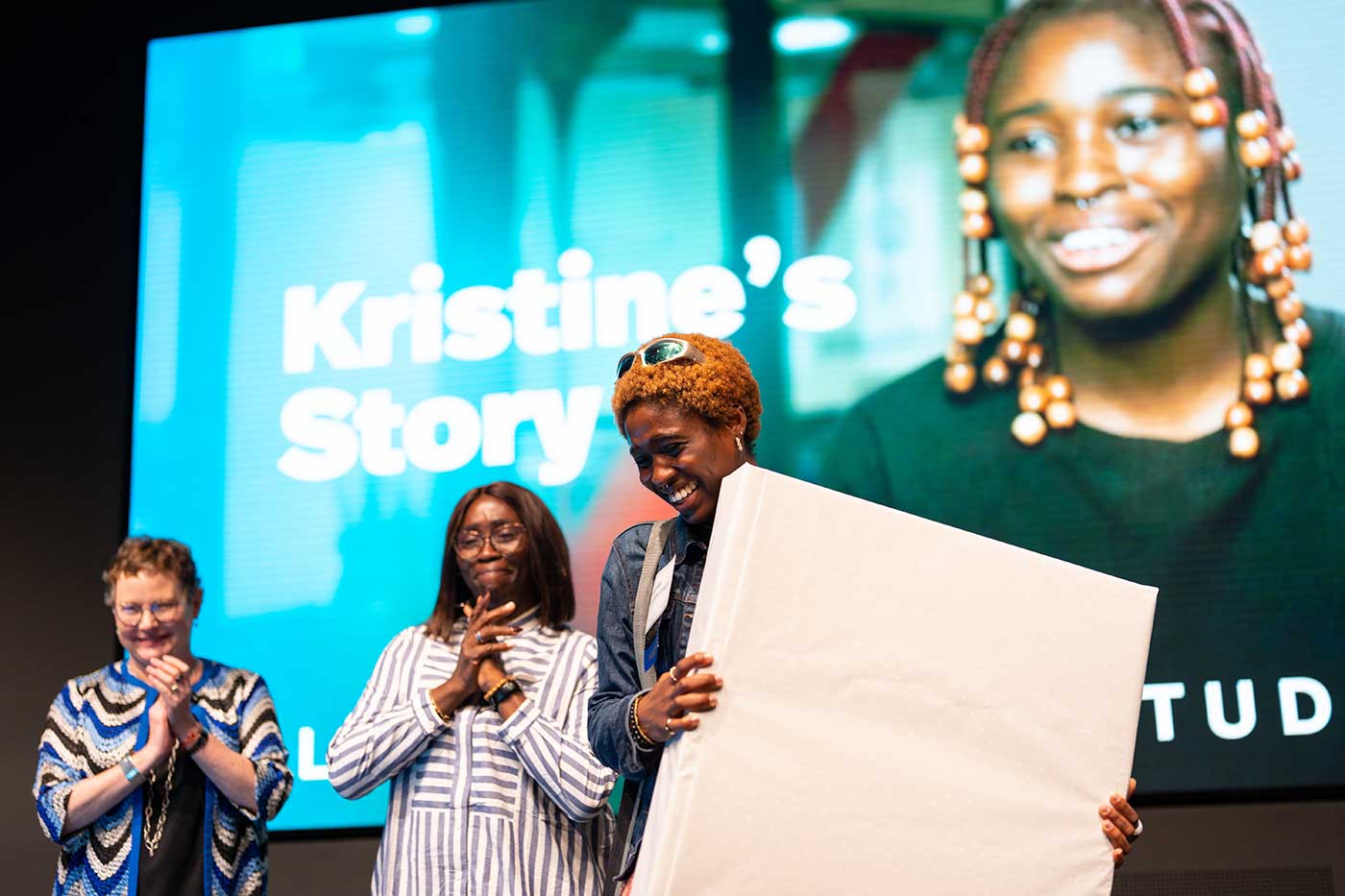
The event closed with recognizing the final 40 for 40 honorees:
- Mani Sundaram, a master’s alumnus, executive VP at software company (and co-op employer) Akamai, and keynote speaker at Khoury College’s graduate commencement
- Doreen Hodgkin, a former associate dean who worked 35 years at Khoury College, beloved by students for supporting them through emergencies and keeping them on track with their studies
- Melvin Simms, who launched the college’s co-op program in 1982, shepherded it for 30 years, and developed its infrastructure to benefit students and employers
- Cathy Bilotta, one of the college’s first grads who has spent her recent years giving back to her “happy place,” paving the way for other women in technology; also the mother of a Khoury College graduate
- Brecka Fetzer and Wayne Duso, who helped build a program to elevate the number of Align students working at Amazon Web Services
- Rehka Kamat, a master’s alumna and a global marketing director for a multinational software firm; champion for women in technology
- Bela Labovitch, a master’s alumna, engineering VP at athenahealth, and fierce advocate for attracting and retaining women in tech
- Melinda Kramer, an alumna who built her career at the intersection of finance and tech, and who is focusing on advocacy and philanthropy in retirement
- Harriet Fell, Northeastern math professor who jumped to CS instruction when the college was founded; a pioneer in creating technologies for people with disabilities
- Brian Wenzinger, alumnus who benefitted from scholarships and has given generously to fund education — including out-of-the-classroom opportunities — for those who came after him
- Glen Coppersmith, whose CS and psychology degree paved the way for his career in data-driven mental health care, and who received Khoury College’s Outstanding Alumni Award in 2019
And with that, a year’s worth of reflection came to an end. After 40 years of education, research, and innovation, of professional partnerships, of bringing computing to populations the field all too often leaves behind, all that’s left is to look to the future.
“As we close out this anniversary, the question before us is ‘How will Khoury College rise to the challenges on the horizon, and to the challenge of ensuring that breakthroughs are used for good and not for evil?’” Madigan said. “Congratulations on all you have accomplished together and all you will accomplish in the years to come.”
